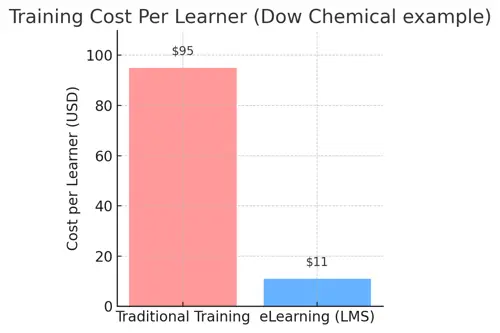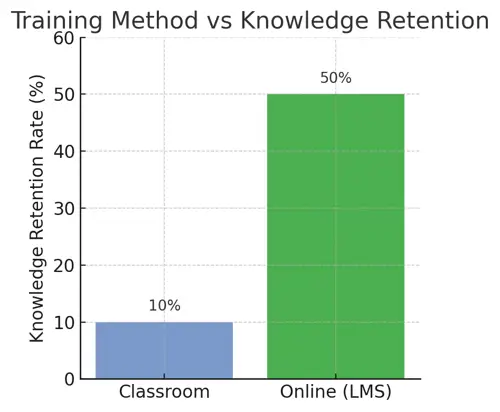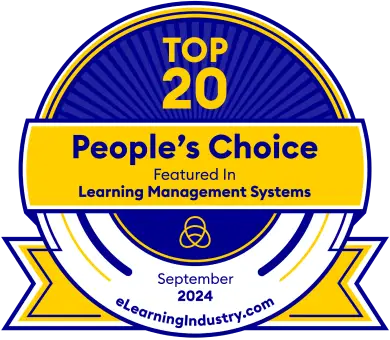An LMS is a digital platform for delivering and tracking training, and it offers a modern, scalable approach to learning and development (L&D). Below, we explore the top 10 benefits of an LMS for both employees and organisations, with a focus on how these advantages address the needs of hospitality companies. Each benefit is presented in a conversational yet professional tone, highlighting comparisons with traditional training and backed by relevant data and UK-focused insights.
1. Higher Employee Engagement and Motivation
Quality training can boost employee morale, and an LMS provides tools to make learning engaging. Unlike a lecture-style classroom where staff might zone out after a long shift, an LMS can incorporate interactive content, videos, quizzes, and even gamification elements that keep learners interested. Hospitality staff, from hotel receptionists to restaurant servers, tend to be on their feet all day – engaging e-learning modules that can be taken in short bursts are far more stimulating than sitting through hours of printed policy reviews.
Importantly, organisations that leverage LMS-based training see measurable engagement improvements. One analysis found companies using e-learning enjoyed an 18% boost in employee engagement on average. This is echoed in the UK hospitality context: 68% of hospitality managers believe their current training programmes help employees stay engaged and motivated. Higher engagement matters because engaged employees are more likely to provide better customer service and remain with the company longer. In essence, an LMS turns training into a dynamic experience – something staff want to do, rather than have to do.
Moreover, LMS platforms can tap into social learning (discussion forums, leaderboards for courses, etc.), fostering a sense of community and healthy competition among learners. This social aspect can be a big motivator, especially for younger employees who appreciate interaction and recognition. Compared to traditional methods (where feedback might be limited to end-of-course surveys), an LMS keeps motivation high through immediate feedback (e.g. instant quiz results) and visible progress dashboards. The result is a more energised workforce that treats learning as an ongoing journey, not a one-off event.
2. Greater Flexibility and Convenience in Learning
One of the most celebrated benefits of an LMS is the flexibility it offers. In hospitality, staff work varied shifts, nights, and weekends – scheduling everyone for a classroom session at once can be a logistical nightmare. An LMS allows employees to access training anytime and anywhere, whether it’s a bartender completing a module on cocktail upselling during a quiet afternoon, or a hotel housekeeper reviewing safety guidelines from home. This self-paced, on-demand learning is a game-changer for employees who can fit development around their busy (and often irregular) schedules.
Statistics show that employees value this flexibility. In fact, 58% of employees prefer to learn at their own pace and a majority now expect “just-in-time” learning resources that they can tap into when needed. Unlike traditional classroom training that forces all learners into the same time slot regardless of readiness or energy levels, an LMS empowers staff to learn when they’re most receptive. For the organisation, this means training no longer disrupts operations – there’s no need to pull an entire team off the floor for an afternoon.
From a learning effectiveness standpoint, convenience drives completion. Staff are more likely to finish courses when they can pause and resume on their terms, as opposed to sitting through a fixed three-hour workshop. Whether it’s through a mobile app or a web portal, LMS content can be consumed during commutes, breaks, or between shifts. This flexibility leads to higher course completion rates, which in turn means the organisation’s investment in training actually translates into knowledge gained. In short, an LMS fits the learning to the learner, rather than forcing the learner to fit the training schedule.
3. Scalability and Consistency of Training Delivery
Growing hospitality businesses – from expanding restaurant chains to hotel groups – need training that scales. Traditional training methods (like in-person “train the trainer” cascades or printed manuals) often result in inconsistent messages and quality. An LMS ensures consistent training content is delivered across the organisation, no matter if you have one hotel or a hundred. Every employee can receive the same high-standard course, updated in real-time, which is critical for maintaining brand standards and service quality in hospitality.
Scalability also means you can increase the volume of training without a proportional increase in cost or logistical effort. Onboarding 50 new staff at once is just as straightforward as onboarding five – you simply assign courses in the LMS, rather than coordinating multiple orientation sessions. Most companies have recognised this advantage: 83% of companies now use an LMS as part of their training strategy. In the hospitality sector specifically, a recent survey found 79% of HR and L&D managers already use an LMS or dedicated training software underscoring that digital learning platforms have become the norm for scalable L&D.
Crucially, an LMS guarantees consistency. With face-to-face training, two different instructors might teach the same material with different emphases or quality, and printed SOP (Standard Operating Procedure) manuals might sit on a shelf outdated. In contrast, e-learning courses can be centrally updated so that every employee gets the latest information (for example, a new menu update or a policy change) immediately and uniformly. This is especially beneficial for compliance and brand consistency in hospitality – for instance, ensuring all locations follow the same health and safety protocols and service standards. Consistent training through an LMS builds a reliable level of competency across the workforce, which guests will notice in improved and uniform service delivery.
4. Cost Savings and Return on Investment (ROI)
For senior management, the bottom line is always a consideration. Implementing an LMS can significantly reduce training costs and deliver strong ROI. Think about the expenses associated with traditional training: travel and accommodation for trainers (or for staff to attend off-site workshops), renting training rooms, printed materials, catering, and lost productivity while employees are off the job. An LMS minimises or eliminates many of these costs. Content is delivered online, printing is unnecessary, and employees can train from their usual workplace or home without travel.
In fact, organisations can save up to 50% on training costs by embracing digital learning solutions. A well-known example is Dow Chemical, which cut its average training cost per learner from $95 to just $11 by switching from classroom training to eLearning delivery. That’s a dramatic cost reduction (as illustrated above) without sacrificing learning quality. Similarly, IBM reported saving $200 million after moving a significant portion of their training online. These savings come not only from direct cost cuts but also from time savings – studies indicate eLearning takes 40–60% less time to complete than traditional classroom learning. In other words, employees spend less time in training and more time applying skills on the job, which boosts productivity.
The ROI of an LMS isn’t just about cutting costs – it’s also about gains in performance. IBM found that every dollar invested in online training resulted in an impressive $30 in increased productivity. Faster training cycles mean staff can get up to speed quicker (vital in hospitality where new promotions or menus roll out frequently), and improved learning retention (discussed later) means they make fewer mistakes, saving money that would be lost due to errors or poor service. When pitching to stakeholders, it’s powerful to note that an LMS is not just a cost centre but a value generator. Over time, the investment in a scalable LMS platform typically pays for itself through a combination of direct cost savings and indirect benefits like higher revenue (for instance, better-trained staff often deliver better guest experiences, leading to repeat business).
5. Improved Compliance and Tracking
Compliance is serious business in hospitality. From food hygiene certifications and health & safety regulations to GDPR data protection and alcohol licensing laws – ensuring every employee is properly trained and up-to-date is non-negotiable. An LMS excels at managing and tracking mandatory training compliance. Instead of keeping manual records or spreadsheets of who attended which workshop, the LMS automatically records course completion, assessment scores, and certification expiry dates. This digital paper trail makes it easy for HR and managers to see at a glance who has completed required courses and who might need a reminder.
For the organisation, this mitigates risk significantly. For example, if a health inspector or an insurance auditor asks for proof that all staff have undergone safety training, you can generate a compliance report from the LMS in seconds. The system can also be set to automatically remind employees (and their managers) when a refresher or re-certification is due – much more reliable than hoping a manual diary or email list is kept up to date. In contrast, traditional training methods often rely on sign-in sheets and filing cabinets of certificates, which are prone to error and hard to update promptly.
Employees benefit too: they get clear visibility of their required learning and deadlines, often with a personal dashboard. This clarity can reduce stress, as staff are less likely to accidentally fall out of compliance. The LMS can even host the content for compliance training (e.g. interactive lessons on food safety) making it more engaging than a dull booklet. The results speak for themselves – organisations that implement modern LMS solutions often achieve near-perfect compliance. For instance, one UK public sector organisation was able to ensure 100% of employees met their compliance training requirements after rolling out an all-in-one LMS. In short, an LMS acts as an insurance policy for compliance: it guarantees no one slips through the cracks, and it makes maintaining standards a streamlined process rather than a scramble.
6. Personalised Learning and Development Paths
In a traditional classroom session, every employee gets the same content delivered in the same way, regardless of their prior knowledge or specific role. An LMS allows for a more personalised approach. Courses and learning paths can be tailored to different job roles (e.g. a hotel front desk agent gets a curriculum on customer service and reservation systems, while a chef gets content on food safety and kitchen management). Employees can also take optional courses beyond their mandatory training, aligning with their career aspirations – for example, a waiter interested in management can access leadership modules at their own initiative. This personalised, self-directed learning is empowering and keeps employees invested in their growth.
The demand for personalised training is high: 91% of employees say they want relevant, personalised learning as part of their development. With an LMS, you can use assessments or quizzes to identify an individual’s skill gaps and then automatically recommend courses to fill those gaps. This means employees aren’t wasting time on topics they already know, and they can focus on developing the skills that matter for their progression. From the organisation’s perspective, this targeted development leads to a more skilled and versatile workforce. You’re essentially building a talent pipeline internally – for instance, training high-potential staff in supervisory skills so they are ready to step up to management roles (crucial in hospitality, which often promotes from within).
Personalisation extends to learning styles too. Some employees might prefer video tutorials, others might like reading text, and some learn best through doing (interactive simulations). An LMS can accommodate all these preferences by offering content in multiple formats. This contrasts with one-size-fits-all classroom training which might only cater to one dominant style (often lecture format). By personalising the experience, an LMS keeps learners more engaged and helps them absorb the material better. In essence, each employee gets their own learning journey. For a senior leader, this means your L&D programme becomes a powerful tool to drive individual performance and loyalty – employees feel valued when their employer invests in their specific growth, not just generic training for all.
7. Faster Onboarding and Reduced Time-to-Competency
Bringing new hires up to speed quickly is a constant challenge in hospitality, where turnover is high and peak seasons demand staff who can hit the ground running. An LMS significantly accelerates the onboarding process. Instead of waiting for the next scheduled classroom induction (which might be weeks away), new starters can begin their training on day one through an LMS. They can learn about company values, service standards, product knowledge (menu items, hotel brand offerings, etc.), and operational procedures through well-structured online modules. This means even before a new employee sets foot on the floor, they have a foundational understanding of their role.
The impact on time-to-competency is substantial. Many companies have reported dramatic improvements in onboarding speed with LMS-driven training. For example, a UK hospitality group (including casino venues) achieved a 75% reduction in onboarding time by digitising their induction training with an LMS. Similarly, a major staffing firm saw onboarding times drop by 40% while also increasing training completion by 60% after implementing an LMS. These are real, quantified benefits – new employees become productive weeks faster than before, which can translate into better service and lower costs from temporary under-staffing or overtime coverage.
From the employee’s viewpoint, a well-designed LMS onboarding journey is more welcoming and less overwhelming. They can absorb information at their own pace, revisit modules if needed, and not feel the pressure of a one-time “firehose” orientation day. They also get introduced to the company culture and expectations consistently – important for hospitality brands that pride themselves on a certain ethos or level of service. Plus, early exposure to an LMS signals that the company is invested in modern development tools, which can reassure new hires that they’ll have ongoing support and learning opportunities. All of this contributes to a smoother onboarding experience and helps newcomers gain confidence quickly. When employees reach full competence faster, it not only saves the organisation money, but also often improves guest satisfaction, as staff are well-prepared to deliver excellent service sooner.
8. Data-Driven Insights and Continuous Improvement
One of the unsung benefits of an LMS is the wealth of analytics and data it provides. Senior leaders can get dashboards and reports on training metrics – course completion rates, quiz scores, time spent on modules, feedback ratings, and more. This data turns L&D into a science rather than guesswork. For instance, if you see that a particular course has a low completion rate or many failing quiz scores, it’s a signal that something might be off – maybe the content is not engaging or the material is too difficult. You can then refine the course content or structure based on these insights. In traditional training, such issues might go unnoticed until problems surface on the job, because there wasn’t a systematic way to track and measure learning effectiveness.
Analytics also help identify high performers and those who might need extra support. Managers can see, for example, that one team member aced all the beverage knowledge modules (making them a great candidate for a sommelier course), whereas another struggled with the point-of-sale system training (flagging that they might need one-on-one coaching). This allows timely interventions – before mistakes happen on the restaurant floor or at reception. LMS analytics have been shown to improve course completion and success rates by enabling targeted improvements. For example, if data reveals many learners drop out at a certain module, L&D teams can investigate and adjust that content to make it more engaging or clear, thus keeping learners on track. In this way, the LMS creates a feedback loop for continuous improvement of training programs.
From a strategic perspective, having concrete L&D data helps make the business case for training investments. You can correlate training metrics with performance metrics – perhaps sites with higher training completion have higher customer satisfaction scores or lower accident rates. These insights are gold for senior management. By contrast, with traditional training you might know how many people attended a workshop, but not much about what they learned or how it impacted their job performance. An LMS closes that gap by providing actionable intelligence. It essentially brings an “analytics mindset” to HR and training, akin to what revenue management systems did for hospitality operations. In an era where data drives decisions, using LMS analytics to fine-tune your learning strategy ensures your training budget is spent where it makes the most impact, and it helps demonstrate ROI to stakeholders with hard numbers.
9. Better Knowledge Retention and Performance on the Job
The ultimate goal of any training is to have employees retain knowledge and apply it in their work. Studies have consistently found that eLearning can lead to higher knowledge retention rates than traditional methods. The Research Institute of America famously noted that while face-to-face training yields only about 8–10% retention, eLearning techniques can boost retention to 25–60%. The visual above illustrates this stark difference. There are a few reasons for this advantage: LMS courses often allow learners to review material again later (reinforcing memory), present content in multimedia formats (catering to visual and auditory learning which aids recall), and break learning into shorter modules (preventing cognitive overload). Also, employees can directly apply what they learned sooner, since they often train just-in-time for tasks, which helps solidify knowledge.
In the hospitality environment, better retention means, for example, a concierge who actually remembers the details of the latest upselling training when talking to guests, or a kitchen staff member who recalls the correct cleaning procedure even under pressure. High retention is critical when safety and service procedures must be executed flawlessly. LMS-based training often includes periodic knowledge checks or refresher micro-courses that reinforce key points over time, combating the “forgetting curve” that plagues one-off workshops.
Additionally, the interactive nature of LMS content (like scenario-based quizzes or simulations) means employees learn by doing, not just by listening. This active learning approach is proven to improve recall. One stat even shows people are 95% more likely to remember information delivered through video compared to text alone, underscoring why video-rich eLearning outperforms a printed handbook. For the organisation, the payoff is employees who not only attend training, but actually learn and retain it. This translates into better on-the-job performance, whether it’s higher customer satisfaction scores, fewer compliance incidents, or simply the smooth, competent operation of daily tasks. In short, an LMS helps ensure that training “sticks,” making your investment far more effective than traditional training where much of the content might be forgotten a week later.
10. Increased Employee Satisfaction and Retention (Talent Retention)
Investing in an LMS for employee development sends a clear message: we care about your growth. This has a profound effect on employee satisfaction and loyalty. Hospitality, as noted, grapples with high turnover – but offering robust learning opportunities can help turn that tide. When employees see that they have access to courses to improve their skills, earn certifications, or advance their careers, they feel valued and more engaged with their employer. Many will stay longer with a company that supports their professional development. In fact, 76% of employees say they are more likely to stay with a company that offers continuous training and development opportunities. Similarly, another study found 94% of employees would stay longer if their company invested in their career growth. These figures highlight that training isn’t just an extra perk – it’s a key driver of retention.
For the organisation, this benefit is twofold: you retain talent (reducing the costs and disruption of constant rehiring) and you cultivate better talent from within. Particularly in hospitality, promoting from within is common – many hotel general managers and restaurant leaders started in entry-level roles. An LMS helps map out those internal career pathways by providing the training steps needed for an employee to climb the ladder. This increases morale, as staff can envision a future with the company. It also enhances your employer brand; a strong learning culture makes the company more attractive when recruiting. Eight in ten HR professionals agree that offering training helps attract and retain top talent, which is crucial in a competitive labour market.
From a senior leader’s perspective, improved retention through learning opportunities directly ties into business outcomes: better staff retention often leads to better customer retention, because guests appreciate seeing familiar, experienced faces and receiving knowledgeable service. Plus, long-serving employees typically operate more efficiently and uphold company values more strongly, contributing to operational excellence. All these benefits stem from a relatively simple premise – when you invest in your people’s development via an LMS, they invest back in the company with their loyalty and effort. It’s a win-win that turns training from an expense into a strategy for building a stable, high-performing team.
Conclusion: Embracing a Scalable LMS for Future Growth
We’ve covered ten compelling benefits of implementing an LMS, each addressing pain points of traditional training with modern, effective solutions. From boosting engagement and knowledge retention to slashing costs and improving compliance, the evidence is clear that an LMS can transform learning and development in the hospitality sector. For a hotel or restaurant group aiming to stay competitive and deliver consistent excellence, leveraging an LMS is fast becoming best practice rather than cutting-edge. The beauty of these platforms is that they grow with you – whether you’re onboarding 5 new starters or 500, the process remains smooth and efficient.
If you’re a hospitality HR professional or L&D leader, now is a great time to consider exploring a scalable LMS platform that fits your organisation’s needs. The right LMS will not only address your current challenges (like dispersed teams or the need for better training insights) but will also future-proof your L&D strategy as the industry evolves. In a sector built on delivering great experiences, empowering your employees through continuous learning is one of the best investments you can make. By embracing an LMS, you’re equipping your workforce with the tools to succeed and your organisation with the agility to adapt – ultimately setting the stage for a thriving, learning-driven company culture. In short: take the next step, and let a modern LMS help your business and your people flourish together.
-
HR News – UK Hospitality Industry Faces Significant Challenges
hrnews.co.uk
-
Lingio – Employee Training & Development in Hospitality (2024 Report)
lingio.com









